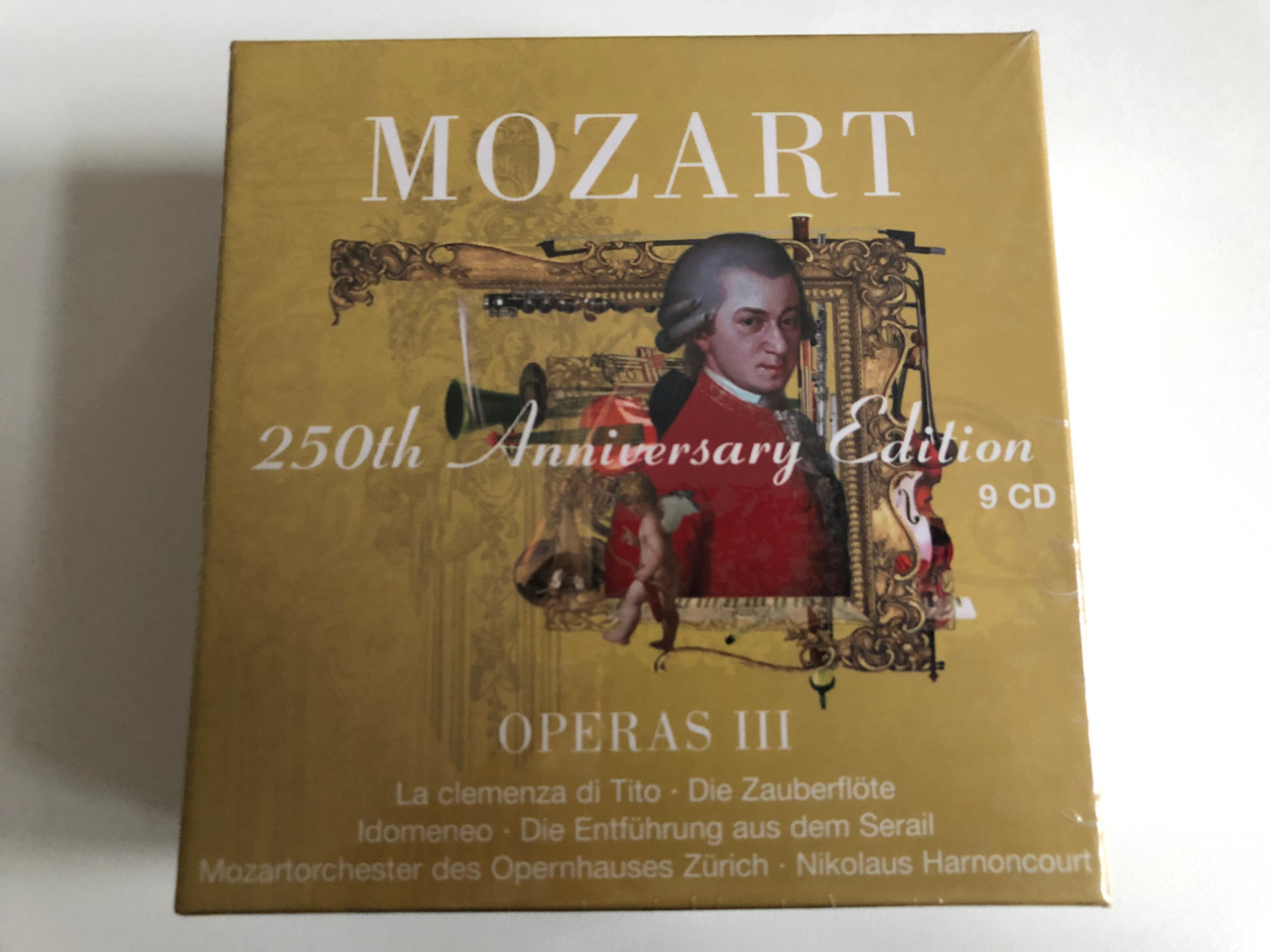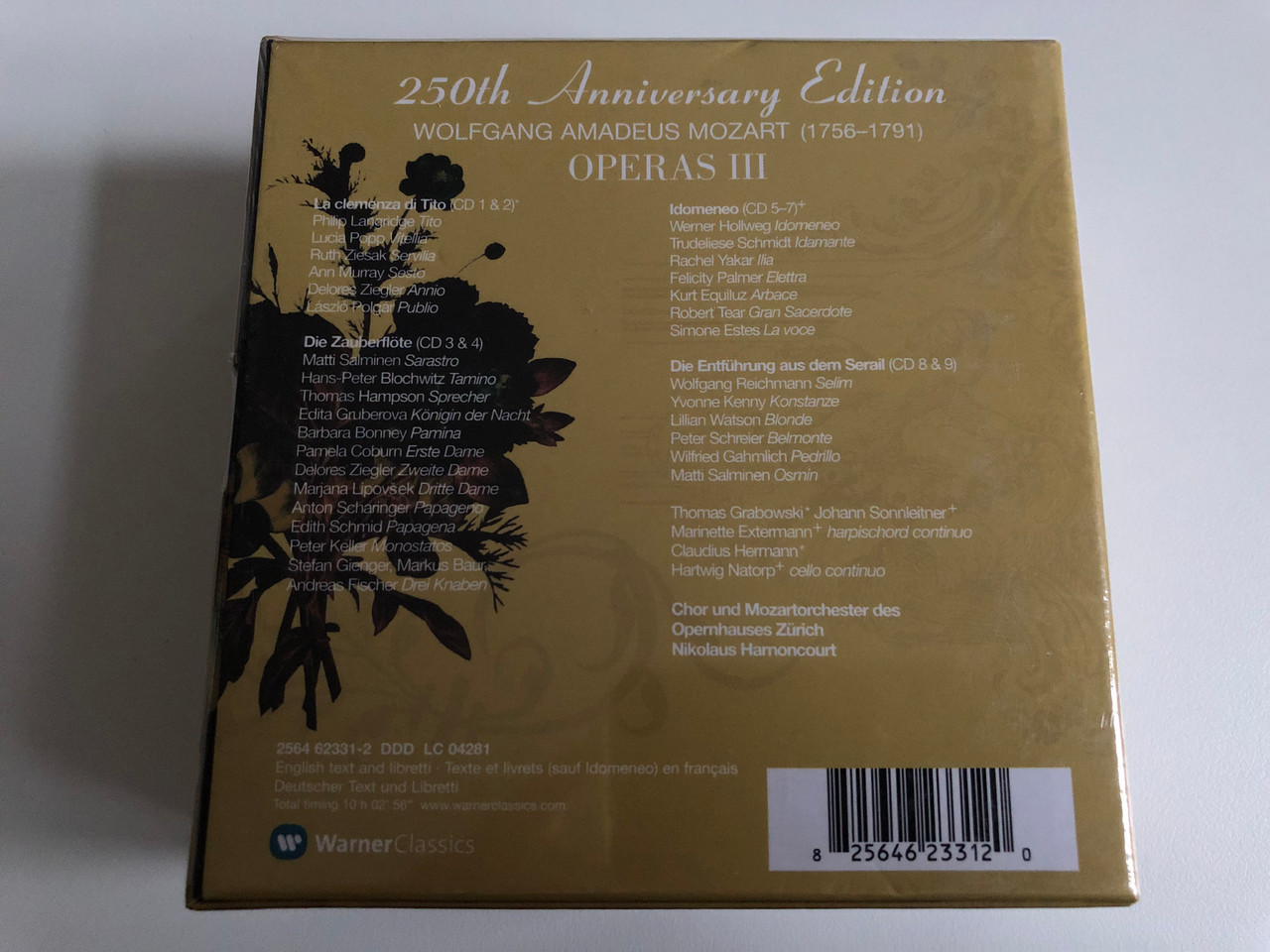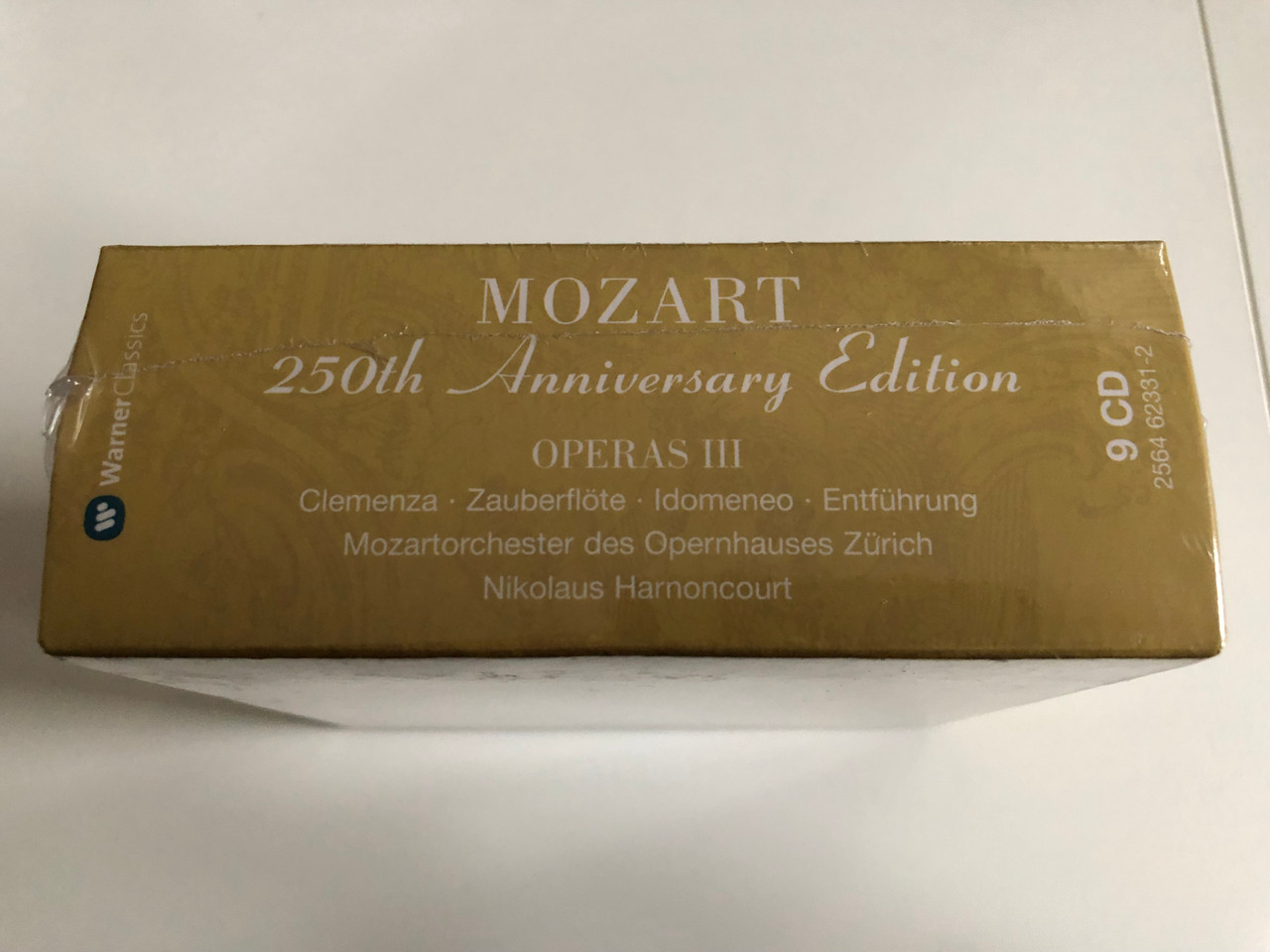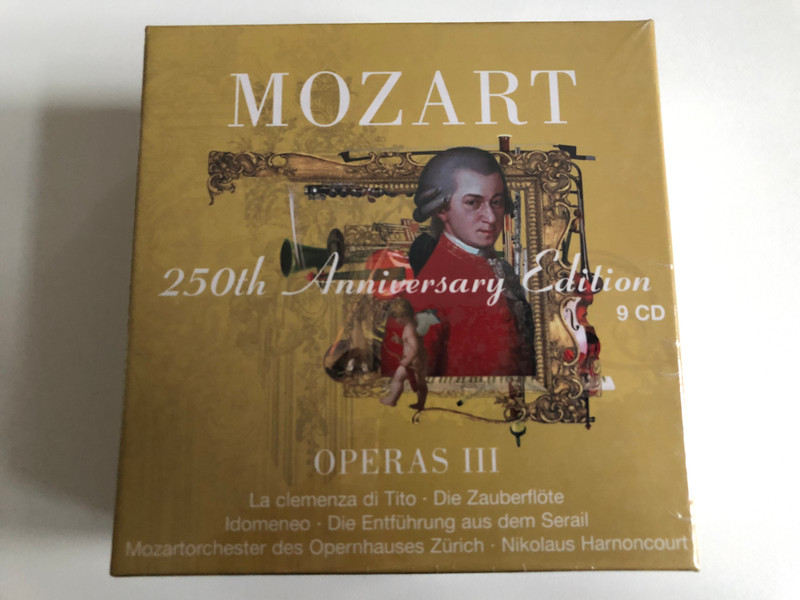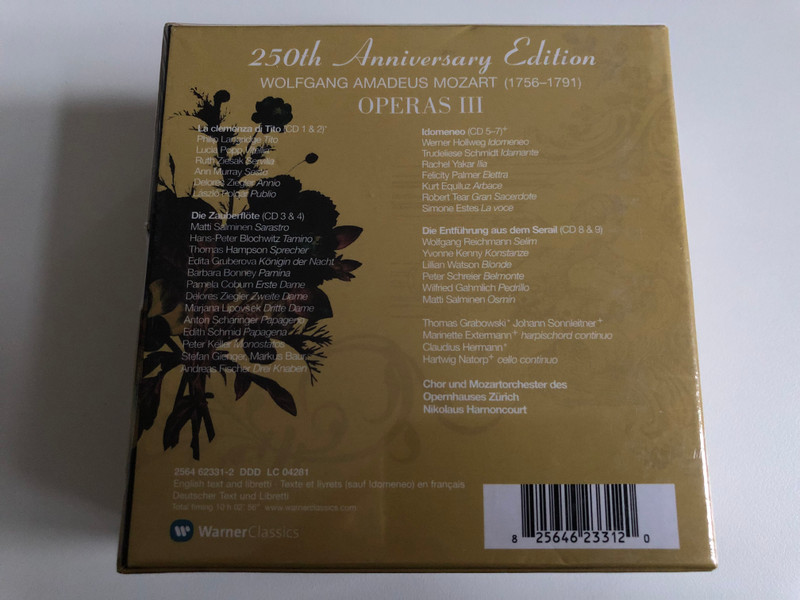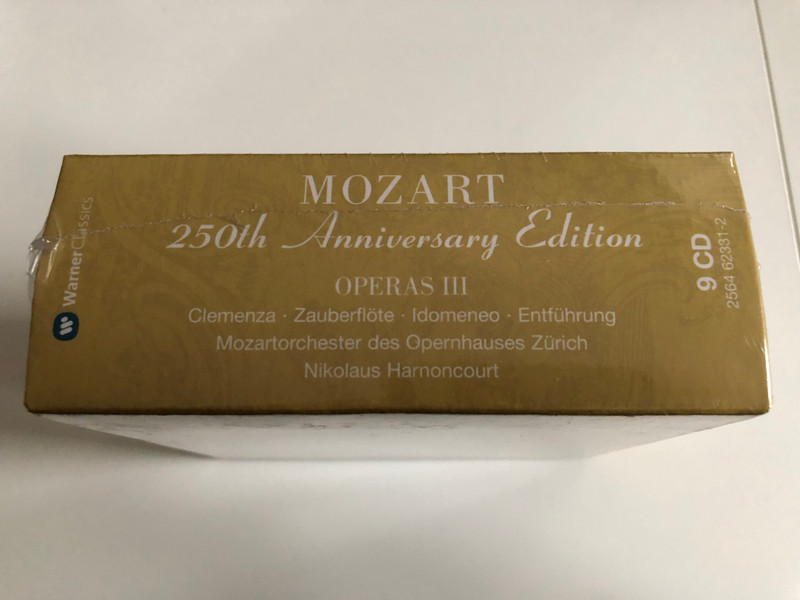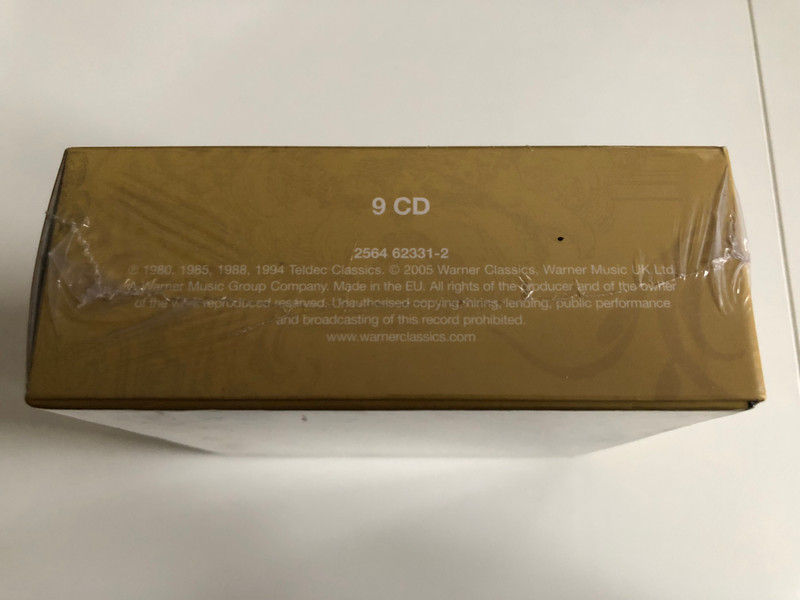Mozart - 250th Anniversary Edition - Operas III: La Clemenza di Tito, Die Zauberflöte, Idomeneo, Die Entführung Aus Dem Serail / Mozartorchester des Opernhauses Zurich / Warner Classics 9x Audio CD 2005 / 2564 62331-2
UPC 825646233120
La clemenza di Tito (The Clemency of Titus), K. 621, is an opera seria in two acts composed by Wolfgang Amadeus Mozart to an Italian libretto by Caterino Mazzolà, after Pietro Metastasio. It was started after most of Die Zauberflöte (The Magic Flute), the last of Mozart's principal operas, had already been written. The work premiered on 6 September 1791 at the Estates Theatre in Prague.
The Magic Flute (German: Die Zauberflöte, pronounced [ˈdiː ˈt͡saʊ̯bɐˌfløːtə]), K. 620, is an opera in two acts by Wolfgang Amadeus Mozart to a German libretto by Emanuel Schikaneder. The work is in the form of a Singspiel, a popular form during the time it was written that included both singing and spoken dialogue. The work premiered on 30 September 1791 at Schikaneder's theatre, the Freihaus-Theater auf der Wieden in Vienna, just two months before the composer's premature death. Still a staple of the opera repertory, its popularity was reflected by two immediate sequels, Peter Winter's Das Labyrinth oder Der Kampf mit den Elementen. Der Zauberflöte zweyter Theil (1798) and a fragmentary libretto by Johann Wolfgang von Goethe titled The Magic Flute Part Two.
The allegorical plot was influenced by Schikaneder and Mozart's interest in Freemasonry and concerns the initiation of Prince Tamino. Enlisted by the Queen of the Night to rescue her daughter Pamina from the high priest Sarastro, Tamino comes to admire the high ideals of the latter and he and Pamina both join Sarastro's community, while the Queen and her allies are vanquished.
Idomeneo, re di Creta ossia Ilia e Idamante (Italian for Idomeneus, King of Crete, or, Ilia and Idamante; usually referred to simply as Idomeneo, K. 366) is an Italian language opera seria by Wolfgang Amadeus Mozart. The libretto was adapted by Giambattista Varesco from a French text by Antoine Danchet, based on a 1705 play by Crébillion père, which had been set to music by André Campra as Idoménée in 1712. Mozart and Varesco were commissioned in 1780 by Karl Theodor, Elector of Bavaria for a court carnival. He probably chose the subject, though it may have been Mozart. The work premiered on 29 January 1781 at the Cuvilliés Theatre in Munich, Germany. It is now considered one of the greatest operas of all time.
Die Entführung aus dem Serail (German: [diː ʔɛntˈfyːʁʊŋ ʔaʊ̯s deːm zɛˈʁaɪ̯]) (K. 384; The Abduction from the Seraglio; also known as Il Seraglio) is a singspiel in three acts by Wolfgang Amadeus Mozart. The German libretto is by Gottlieb Stephanie, based on Christoph Friedrich Bretzner's Belmont und Constanze, oder Die Entführung aus dem Serail. The plot concerns the attempt of the hero Belmonte, assisted by his servant Pedrillo, to rescue his beloved Constanze from the seraglio of Pasha Selim. The work premiered on 16 July 1782 at the Vienna Burgtheater, with the composer conducting.
| Label: |
Warner Classics – 2564 62331-2 |
|---|
| Series: |
250th Anniversary Edition |
|---|
| Format: |
9 x CD, Album, Compilation, Box Set
|
|---|
| Country: |
Europe |
|---|
Released:
|
2005 |
|---|
| Genre: |
Classical |
|---|
| Style: |
Classical, Opera |
|---|
Tracklist:
| 1-1 |
|
La Clemenza di Tito, K621: Ouverture
Bass Vocals [Publio] – László Polgár
Chorus – Chor der Oper Zürich
Engineer – Michael Brammann
Executive Producer – Renate Kupfer, Wolfgang Mohr
Mezzo-soprano Vocals [Annio] – Delores Ziegler
Mezzo-soprano Vocals [Sesto] – Ann Murray
Orchestra – Orchester der Oper Zürich
Recording Supervisor – Helmut Mühle
Soprano Vocals [Servilia] – Ruth Ziesak
Soprano Vocals [Vitellia] – Lucia Popp
Tenor Vocals [Tito] – Philip Langridge
|
|
4:45
|
| |
|
La Clemenza di Tito: Atto Primo |
|
| 1-2 |
|
Recitativo “Ma chè? sempre l’istesso” [Vitellia, Sesto] |
2:36 |
| 1-3 |
|
No. 1: Duetto “Come ti piace imponi” [Sesto, Vitellia] |
2:50 |
| 1-4 |
|
Recitativo “Amico, il passo affretta” [Annio, Vitellia, Sesto] |
1:12 |
| 1-5 |
|
No. 2: Aria “Deh se piacer mi vuoi” [Vitellia] |
5:29 |
| 1-6 |
|
Recitativo “Amico, ecco il momento” [Annio, Sesto] |
0:27 |
| 1-7 |
|
No. 3: Duettino “Deh prendi un dolce amplesso” [Annio, Sesto] |
1:00 |
| 1-9 |
|
No. 5: Coro “Serbate, oh Dei custodi” |
1:49 |
| 1-10 |
|
Recitativo “Basta, basta” [Tito, Annio, Sesto] |
2:50 |
| 1-11 |
|
No. 6: Aria “Del più sublime soglio” [Tito] |
3:03 |
| 1-12 |
|
Recitativo “Non ci pentiam” [Annio, Servilia] |
1:38 |
| 1-13 |
|
No. 7: Duetto “Ah perdona al primo affetto” [Annio, Servilia] |
3:07 |
| 1-14 |
|
Recitativo “Che mi rechi in quel foglio?” [Tito, Publio] |
0:50 |
| 1-15 |
|
Recitativo “Di Tito al piè” [Servilia, Tito] |
1:26 |
| 1-16 |
|
No. 8: Aria “Ah, se fosse intorno al trono” [Tito] |
2:15 |
| 1-17 |
|
Recitativo “Felice me!” [Servilia, Vitellia] |
0:32 |
| 1-18 |
|
Recitativo “Ancora mi schernisce” [Vitellia, Sesto] |
1:58 |
| 1-19 |
|
No. 9: Aria “Parto, ma tu ben mio” [Sesto] |
6:55 |
| 1-20 |
|
Recitativo “Vedrai, Tito, vedrai” [Vitellia, Publio, Annio] |
0:54 |
| 1-21 |
|
No. 10: Terzetto “Vengo...aspettate” [Vitellia, Publio, Annio] |
2:37 |
| 1-22 |
|
No. 11: Recitativo accompagnato “Oh Dei, che smania” [Sesto] |
3:24 |
| 1-23 |
|
No. 12: Quintetto “Deh, conservate, oh Dei” [Sesto, Annio, Servilia, Publio, Vitellia] |
7:03 |
| |
|
La Clemenza di Tito: Atto Secondo
|
|
| 2-1 |
|
Recitativo “Sesto, come tu credi” [Annio, Sesto] |
1:42 |
| 2-2 |
|
No. 13: Aria “Torna di Tito a lato” [Annio] |
2:31 |
| 2-3 |
|
Recitativo “Partir deggio, o restar?” [Sesto, Vitellia] |
0:30 |
| 2-4 |
|
Recitativo “Sesto! - Che chiedi?” [Publio, Sesto, Vitellia] |
0:31 |
| 2-5 |
|
No. 14: Terzetto “Se al volto mai ti senti” [Sesto, Vitellia, Publio] |
5:35 |
| 2-6 |
|
No. 15: Coro “Ah grazie si rendano” [Chorus, Tito] |
3:27 |
| 2-7 |
|
Recitativo “Andremo, Publio” [Tito, Publio] |
0:46 |
| 2-8 |
|
No. 16: Aria “Tardi s’avvede” [Publio] |
1:55 |
| 2-9 |
|
Recitativo “No, così scellerato” [Tito, Annio, Publio] |
1:24 |
| 2-10 |
|
No. 17: Aria “Tu fosti tradito” [Annio] |
3:20 |
| 2-11 |
|
Recitativo accompagnato “Che orror! che tradimento!” [Tito] |
2:27 |
| 2-12 |
|
No. 18: Terzetto “Quello di Tito è il volto!” [Sesto, Tito, Publio] |
4:02 |
| 2-13 |
|
Recitativo “Eppur mi fa pietà” [Tito Sesto] |
2:57 |
| 2-14 |
|
No. 19: Rondo “Deh per questo istante solo” [Sesto] |
7:52 |
| 2-15 |
|
Recitativo “Ove s’intese mai più contumace infedeltà?” [Tito] |
1:13 |
| 2-16 |
|
Recitativo “Publio. - Cesare.” [Tito, Publio] |
0:17 |
| 2-17 |
|
No. 20: Aria “Se all’impero, amici Dei” [Tito] |
5:05 |
| 2-18 |
|
Recitativo “Non giova lusingarsi” [Vitellia, Servilia, Annio] |
1:12 |
| 2-19 |
|
No. 21: Aria “S’altro che lacrime” [Servilia] |
1:51 |
| 2-20 |
|
No. 22: Recitativo accompagnato “Ecco il punto, o Vitellia” [Vitellia] |
2:16 |
| 2-21 |
|
No. 23: Rondo “Non più di fiori” [Vitellia] |
7:44 |
| 2-22 |
|
No. 24: Coro “Che del ciel, che degli Dei” |
1:42 |
| 2-23 |
|
Recitativo “Sesto, de’ tuoi delitti” [Tito, Vitellia] |
1:41 |
| 2-24 |
|
No. 25: Recitativo accompagnato “Ma che giorno è mai questo?” [Tito] |
1:40 |
| 2-25 |
|
No. 26: Sestetto con Coro “Tu, è ver, m’assolvi” [Sesto, Tito, Vitellia, Servilia, Annio, Publio] |
4:23 |
| 3-1 |
|
Die Zauberflöte, K620: Overture
Baritone Vocals [Papageno] – Anton Scharinger
Baritone Vocals [Sprecher] – Thomas Hampson
Bass Vocals [Erster Priester] – Alexander Maly
Bass Vocals [Sarastro] – Matti Salminen (2)
Chorus – Chor des Opernhauses Zürich
Engineer – Michael Brammann
Executive Producer – Wolfgang Mohr
Mezzo-soprano Vocals [Dritte Dame] – Marjana Lipovšek
Mezzo-soprano Vocals [Zweite Dame] – Delores Ziegler
Orchestra – Orchester des Opernhauses Zürich
Recording Supervisor – Helmut Mühle
Soprano Vocals [Ein Altes Weiß (Papagena)] – Edith Schmid
Soprano Vocals [Erste Dame] – Pamela Coburn
Soprano Vocals [Königin der Nacht] – Edita Gruberova
Soprano Vocals [Pamina] – Barbara Bonney
Tenor Vocals [Tamino] – Hans Peter Blochwitz
Tenor Vocals [Zweiter Priester] – Waldemar Kmentt
|
|
6:33
|
| |
|
Die Zauberflöte: Erster Aufzug |
|
| 3-2 |
|
No. 1: Introduction “Zu Hilfe! zu Hilfe! sonst bin ich verloren” [Three Ladies, Tamino] |
6:34 |
| 3-4 |
|
No. 2: Aria “Der Vogelfänger bin ich ja” [Papageno] |
3:04 |
| 3-6 |
|
No. 3: Aria “Dies Bildnis ist bezaubernd schön” [Tamino] |
4:06 |
| 3-8 |
|
No. 4: Recitativo ed Aria “O zittre nicht, mein lieber Sohn” [Königin der Nacht] |
4:36 |
| 3-10 |
|
No. 5: Quintetto “Hm! hm! hm!” [Three Ladies, Tamino, Papageno] |
6:36 |
| 3-12 |
|
No. 6: Terzetto “Du feines Täubchen” [Pamina, Monostatos, Papageno] |
1:36 |
| 3-14 |
|
No. 7: Duetto “Bei Männern, welche Liebe fühlen” [Pamina, Papageno] |
4:26 |
| 3-16 |
|
No. 8: Finale “Zum Ziele führt dich diese Bahn” [Pamina, Three Boys, Tamino, Monostatos, Sarastro, Sprecher, Papageno] |
24:48 |
| |
|
Die Zauberflöte: Zweiter Aufzug
|
|
| 3-19 |
|
No. 10: Aria con Coro “O Isis und Osiris” [Sarastro] |
2:57 |
| 4-2 |
|
No. 11: Duetto “Bewahret euch vor Weilbertücken” [Second Priest] |
0:55 |
| 4-4 |
|
No. 12: Quintetto “Wie? Wie? Wie? ihr an diesem Schreckensort?” [Ladies, Tamino, Papageno] |
3:09 |
| 4-6 |
|
No. 13: Aria “Alles fühlt der Liebe Freuden” [Monostatos] |
1:14 |
| 4-8 |
|
No. 14: Aria “Der Hölle Rache kocht in meinem Herzen” [Königin der Nacht] |
3:05 |
| 4-10 |
|
No. 15: Aria “In diesen heil’gen Hallen kennt man die Rache nicht!” [Sarastro] |
4:03 |
| 4-12 |
|
No. 16: Terzetto “Seid uns zum zweiten Mal willkommen” [Boys] |
1:28 |
| 4-14 |
|
No. 17: Aria “Ach ich fühl’s, es ist verschwunden!” [Pamina] |
1:09 |
| 4-16 |
|
No. 18: Chor Der Priester “O Isis, und Osiris, welche Wonne!” [Chorus, Priests] |
3:00 |
| 4-18 |
|
No. 19: Terzetto “Soll ich dich Teurer nicht mehr sehn?” [Pamina, Tamino, Sarastro] |
3:41 |
| 4-20 |
|
No. 20: Aria “Ein Mädchen oder Weibchen wünscht Papageno sich!” [Papageno] |
4:35 |
| 4-22 |
|
No. 21: Finale “Bald prangt, den Morgen zu verkünden” [Königen der Nacht, Pamina, Papagena, Boys, Ladies, Tamino, Monostatos, Armed Men, Sarastro, Papageno] |
31:46 |
| 5-1 |
|
Idomeneo, K366: Ouverture
Bass-Baritone Vocals [La Voce] – Simon Estes
Chorus – Chor des Opernhauses Zürich
Harpsichord – Johann Sonnleitner, Marinette Extermann
Mezzo-soprano Vocals [Idamante] – Trudeliese Schmidt
Orchestra – Mozartorchester Des Opernhauses Zürich
Soprano Vocals [Elettra] – Felicity Palmer
Soprano Vocals [Ilia] – Rachel Yakar
Tenor Vocals [Arbace] – Kurt Equiluz
Tenor Vocals [Gran Sacerdote] – Robert Tear
Tenor Vocals [Idomeneo] – Werner Hollweg
Violoncello – Hartwig Natorp
|
|
5:08
|
| |
|
Idomeneo: Atto Primo |
|
| 5-2 |
|
Recitativo “Quando avran fine omai” [Ilia] No.1: Aria “Padre, germani, addio!” [Ilia] Recitativo “Ecco, Idamante, ahimè!” [Ilia] Recitativo “Radunate i Troiani, ite” [Idamante, Ilia] |
12:34 |
| 5-3 |
|
No. 2: Aria “Non ho colpa” [Idamante] |
6:43 |
| 5-4 |
|
Recitativo “Ecco il misero resto de’ Troiani” [Ilia, Idamante] No. 3: Coro “Godiam la pace, trionfi Amore” |
3:43 |
| 5-5 |
|
Recitativo “Prence, signor...” [Elettra, Idamante, Arbace, Ilia] No.4: Aria “Tutte nel cor...” [Elettra] No.5: Coro “Pietà! Numi, pietà” Pantomima e Recitativo “Eccoci salvi alfin” [Idomeneo] Recitativo “Oh voi, di Marte...” [Idomeneo] |
12:19 |
| 5-6 |
|
No. 6: Aria “Vedrommi intorno...” [Idomeneo] Recitativo “Cieli! che veggo?” [Idomeneo, Idamante] |
10:14 |
| 5-7 |
|
No. 7: Aria “Il padre adorato” [Idamante] Intermezzo |
3:05 |
| 5-9 |
|
No. 9: Coro “Nettuno s’onori, quel nome risuoni” |
5:42 |
| |
|
Idomeneo: Atto Secondo
|
|
| 6-1 |
|
No. 10: Recitativo “Tutto m’è noto” [Arbace, Idomeneo] |
2:12 |
| 6-2 |
|
Aria “Se il tuo duol” [Arbace] |
4:58 |
| 6-3 |
|
Recitativo “Se mai pomposo apparse” [Ilia, Idomeneo] |
1:06 |
| 6-4 |
|
No. 11: Aria “Se il padre perdei” [Ilia] |
6:07 |
| 6-5 |
|
Recitativo “Qual mi conturba i sensi” [Idomeneo] |
2:13 |
| 6-6 |
|
No. 12: “Fuor del mar” [Idomeneo] |
6:27 |
| 6-7 |
|
Recitativo “Frettolosa e giuliva Elettra vien” [Idomeneo, Elettra] |
2:01 |
| 6-8 |
|
No. 13 Aria “Idol mio, se ritroso” [Elettra] No. 14: Marcia e Recitativo “Odo da lunge armonioso suono” [Elettra] |
6:08 |
| 6-9 |
|
Recitativo “Sidonie…" No.15: Coro “Placido…" Recitativo “Vatene…" No.16: Terzetto “Pria…” No.17: Coro “Qual…" Recitativo “Eccoti in…" No.18: Coro “Corriamo…" |
14:19 |
| |
|
Idomeneo: Atto Terzo
|
|
| 6-10 |
|
Recitativo “Solitudini amiche” [Ilia] |
1:01 |
| 6-11 |
|
No. 19: Aria “Zeffiretti lusinghieri” Recitativo “Ei stesso vien...oh Dei!” [Ilia] |
6:00 |
| 6-12 |
|
Recitativo “Principessa, a’tuoi sguardi” No. 20: Duetto “S’io non moro a questi accenti” [Idamante, Ilia] |
8:16 |
| 6-13 |
|
Recitativo “Cieli! che vedo?” No. 21: Quartetto “Andrò ramingo e solo” [Idomeneo, Ilia, Idamante, Elettra] |
8:22 |
| 7-1 |
|
Recitativo “Sire, alla reggia tua immensa turba” [Arbace, Ilia, Idomeneo, Elettra] Recitativo “Sventurata Sidon!” [Arbace] |
4:05 |
| 7-2 |
|
No. 22: Aria “Se colà ne’fati è scritto” [Arbace] |
8:05 |
| 7-3 |
|
No. 23: Recitativo “Volgi intorno lo...” [Gran Sacerdote, Idomeneo] No. 24: Coro “Oh voto tremendo!” [Gran Sacerdote], No. 25: Marcia |
10:54 |
| 7-4 |
|
No. 26: “Cavantina con coro Accolgi, oh re del mar” [Idomeneo, Sacerdoti] |
3:05 |
| 7-5 |
|
Coro “Stupenda vittoria!” Recitativo “Qual risuona qui intorno” [Idomeneo, Arbace] |
1:15 |
| 7-6 |
|
No. 27: Recitativo “Padre, mio caro padre” [Idamante, Idomeneo, Ilia, Gran Sacerdote, Elettra] No. 28: “Ha vinto Amore” [La Voce] |
10:27 |
| 7-7 |
|
No. 29: Recitativo “Oh ciel pietoso!” [Idomeneo, Idamante, Ilia, Arbace, Elettra |
1:30 |
| 7-8 |
|
No. 30: Recitativo “Popoli, a voi l’ultima legge” [Idomeneo] |
4:55 |
| 7-9 |
|
No. 31: Coro “Scenda Amor, scenda Imeneo” No. 32: Ballet KV367 |
4:38 |
| 7-12 |
|
La Chaconne qui reprend |
2:53 |
| 7-13 |
|
Largo - Allegretto - Allegro |
4:57 |
| 8-1 |
|
Die Entführung aus dem Serail, K384: Ouverture
|
4:12 |
| |
|
Die Entführung aus dem Serail: Erster Aufzug
|
(2:48)
|
| 8-2 |
|
No. 1: Aria “Hier soll ich dich denn sehen” [Belmonte |
0:07 |
| 8-3 |
|
Dialog “Aber wie soll ich in den Palast kommen” [Belmonte] |
7:07 |
| 8-4 |
|
No. 2: Lied und Duett “Wer ein Liebchen hat gefunden”-“Verwünscht seist du samt deinem Liede!” [Osmin, Belmonte] |
0:33 |
| 8-5 |
|
Dialog “Könnt’ ich mir doch noch so einen Schurken” [Osmin, Pedrillo] |
0:33 |
| 8-6 |
|
No. 3: Aria “Solche hergelauf’ne Laffen” [Osmin] |
5:33 |
| 8-7 |
|
Dialog “Geh nur, verwünschter Aufpasser” [Pedrillo, Belmonte] |
1:02 |
| 8-8 |
|
No. 4: Recitativo ed Aria “Konstanze! dich wieder zu sehen! - O wie ängstlich, o wie feurig” [Belmonte] |
5:20 |
| 8-9 |
|
Dialog “Geschwind, geschwind auf die Seite” [Pedrillo] |
0:05 |
| 8-10 |
|
No. 5: Chor der Janitscharen “Singt dem grossen Bassa Lieder” |
1:48 |
| 8-11 |
|
Dialog “Immer noch traurig, geliebte Konstanze?” [Selim, Konstanze |
1:07 |
| 8-12 |
|
No. 6: Aria “Ach ich liebte, war so glücklich!” [Konstanze] |
5:44 |
| 8-13 |
|
Dialog “Ihr Schmerz, ihre Tränen, ihre Standhaftigkeit” [Selim, Pedrillo, Belmonte, Osmin] |
1:16 |
| 8-14 |
|
No. 7: “Terzett “Marsch! Marsch! Marsch! trollt euch fort” [Osmin, Belmonte, Pedrillo] |
2:15 |
| |
|
Die Entführung aus dem Serail: Zweiter Aufzug |
|
| 8-15 |
|
No. 8: Aria “Durch Zärtlichkeit und Schmeicheln” [Blonde] |
4:48 |
| 8-16 |
|
Dialog “Zärtlichkeit! Schmeicheln!” [Osmin, Blonde] |
0:51 |
| 8-17 |
|
No. 9: Duetto “Ich gehe, doch rate ich dir” [Blonde, Osmin] |
3:45 |
| 8-18 |
|
Dialog “Wie traurig das gute Mädchen daherkommt” [Blonde] |
0:11 |
| 8-19 |
|
No. 10: Recitativo ed Aria “Welcher Wechsel herrscht in meiner Seele” “Traurigkeit ward mir zum Lose” [Konstanze] |
9:36 |
| 8-20 |
|
Dialog “Ach mein bestes Fräulein!” [Blonde, Konstanze, Selim |
1:05 |
| 8-21 |
|
No. 11: Aria “Martern aller Arten” [Konstanze] |
10:28 |
| 8-22 |
|
Dialog “Ist das ein Traum?” [Selim] |
0:44 |
| 9-1 |
|
Dialog “Kein Bassa, keine Konstanze mehr da?” [Blonde, Pedrillo |
0:49 |
| 9-2 |
|
No. 12: Aria “Welche Wonne, welche Lust” [Blonde] |
3:18 |
| 9-3 |
|
Dialog “Ah, dass es schon vorbei wäre!” [Pedrillo] |
0:19 |
| 9-4 |
|
No. 13: Aria “Frisch zum Kampfe! Frisch zum Streite!” [Pedrillo] |
3:23 |
| 9-5 |
|
Dialog “Ha! Geht’s hier so lustig zu?” [Osmin, Pedrillo] |
0:52 |
| 9-6 |
|
No. 14: Duetto “Vivat Bacchus! Bacchus lebe!” [Pedrillo, Osmin] |
2:16 |
| 9-7 |
|
Dialog “Wahrhaftig, es geht doch nichts über den Wein!” [Pedrillo, Osmin, Belmonte, Konstanze] |
1:03 |
| 9-8 |
|
No. 15: Aria “Wenn der Freude Tränen fliessen” [Belmonte] |
7:31 |
| 9-9 |
|
Dialog “Ich hab’ hier ein Schiff in Bereitschaft” [Belmonte] |
0:09 |
| 9-10 |
|
No. 16: Quartetto “Ach Belmonte! ach mein Leben!” [Konstanze, Belmonte, Pedrillo, Blonde] |
10:58 |
| |
|
Die Entführung aus dem Serail: Dritter Aufzug
|
|
| 9-11 |
|
Dialog “O Konstanze! Wie schlägt mir das Herz!” [Belmonte] |
0:23 |
| 9-12 |
|
No. 17: Aria “Ich baue ganz auf deine Stärke” [Belmonte] |
6:20 |
| 9-13 |
|
Dialog “Alles liegt auf dem Ohr” [Pedrillo] |
0:20 |
| 9-14 |
|
No. 18: Romance “In Mohrenland gefangen war” [Pedrillo] |
2:37 |
| 9-15 |
|
Dialog “Sie macht auf Herr!” [Pedrillo, Konstanze] |
0:35 |
| 9-16 |
|
Dialog “Gift und Dolch! Was ist das?” [Osmin, Belmonte |
0:20 |
| 9-17 |
|
No. 19: Aria “O, wie will ich triumphieren” [Osmin] |
3:32 |
| 9-18 |
|
Dialog “Was gibt’s, Osmin, was gibt’s” [Selim, Osmin, Konstanze, Belmonte] |
2:13 |
| 9-19 |
|
No. 20: Recitativo e Duetto “Welch ein Geschick!”-“Meinetwegen sollst du sterben!” [Belmonte, Konstanze] |
10:36 |
| 9-20 |
|
Dialog “Zitterst du?” [Selim, Belmonte, Konstanze, Pedrillo, Osmin] |
1:43 |
| 9-21 |
|
No. 21: Vauderville “Nie werd’ ich deine Huld verkennen” [Belmonte, Konstanze, Blonde, Pedrillo, Osmin] |
5:27 |
